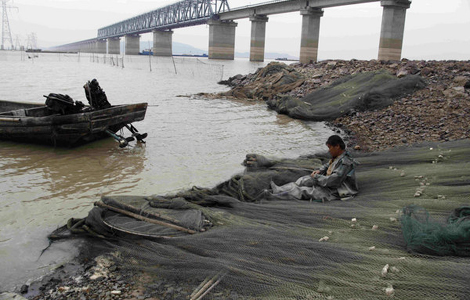Huge profits lure illegal cooking oil business
Updated: 2011-10-18 19:55
(Xinhua)
|
|||||||||||
CHONGQING - The recent bust of a waste cooking oil production and supply chain in Southwest China's Chongqing municipality has aroused a new round of public anxiety over the country's food safety.
Waste cooking oil refers to a kind of illegal cooking oil extracted from the kitchen waste that is used to feed livestock.
After a series of procedures, including collecting, preliminarily extracting, speculative reselling, refining and selling, the oil made its way from dirty trash cans to the tables of up-scale restaurants.
Cao Xianhe is an illegal trader who has operated a waste cooking oil business since 2009. After collecting kitchen waste from university cafeterias and restaurants in Chongqing, he boils the waste to extract crude oil to sell as a raw material for cooking oil.
Xu Ke is a peddler who has been purchasing extracted crude oil in Chongqing since 2005, making profits by selling the crude oil to other cities and provinces.
The refining process was conducted in an oil refinery, where professional equipment could process the crude oil into the final product of waste cooking oil which would then be sold to local grain and oil companies that re-sell the waste cooking oil to markets.
This kind of illegal cooking oil can reach the sanitation standards set for cooking oil after several reprocessing procedures, according to local police.
But a local resident who lives near a workshop for crude oil extraction said the oil is too disgusting to be used as cooking oil.
The workshop, which had been converted from a pig farm, has many large cement pools filled with leftovers and other kitchen waste. Big boilers, each measuring two meters in diameter, sat beside the pools, stinking and infested with flies.
Waste cooking oil can be processed at low-costs, resulting in huge profits welcomed by illegal traders. The crude oil costs about 3,000 yuan ($470) per tonne and can be re-sold at a price of 5,000 yuan per tonne as a raw material for cooking oil. The retail price of the end product can reach about 10,000 yuan per tonne at a farm produce market.
Lured by significant profits, illegal traders took advantage of these kitchen wastes which can not be recycled through regular channels, like being refined for industrial use.
Since the waste cooking oils' specific hazards have not been identified, there is a dire need for more research conducted by experts, said Ding Xinzheng, a professor with the Chongqing Academy of Social Sciences.
Meanwhile, the testing standards for cooking oil have yet to be perfected, Ding said.
To prevent waste cooking oil from being recycled and entering restaurants, the government of Jiulongpo District in Chongqing has come up with a plan to uniformly collect kitchen waste in an effort to cut off the source of the waste cooking oil.
Hot Topics
Libya conflict, Gaddafi, Oil spill, Palace Museum scandal, Inflation, Japan's new PM, Trapped miners, Mooncake tax, Weekly photos, Hurricane Irene
Editor's Picks

|

|

|

|

|

|







